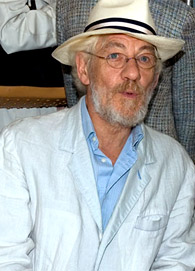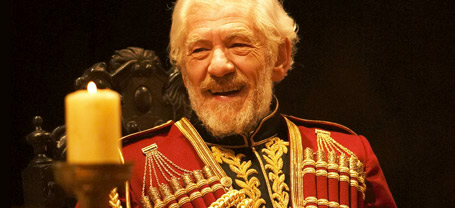I'm at a press conference with Sir Ian McKellen. He's in Singapore for the first stop of the Royal Shakespeare Company's international tour of Shakespeare's King Lear and Anton Chekhov's The Seagull, presented by Singapore Repertory Theatre. The crowd of arts reporters in the auditorium is shooting off eager questions about the duet of plays, which is set to tour next in Melbourne, Wellington, New York, Minneapolis, San Francisco and London.
I'm on a different mission. While I'm in awe of McKellen's acting work (less in his blockbuster roles than for his moving character pieces, such as the gay-themed films Eighteen or Gods and Monsters, which earned him an Oscar nomination), I'm equally starstuck by my knowledge of his work in promoting the cause of gay equality. He came out as a gay man on BBC radio in the '80s, is a co-founder of Stonewall gay rights lobby group in the UK, continues to serve as the patron of LGBT History Month and FFLAG (Friends and Families of Lesbian and Gays), and played the lead role in Martin Sherman's Bent, raising consciousness of the horrific persecution of gay men in Nazi Germany.
So I raise my hand to ask Sir Ian a question about gay rights. And immediately, he insists on a one-on-one interview after the conference, despite a backlog of appointments with mainstream media sources. "I've got a lot to say," he tells me.
And certainly, McKellen does have a lot to say about our country's still-extant Section 377A clause in the Penal Code, which criminalises acts of sex between men. Using the weight of his fame, he's been cleverly making his feelings known to mainstream news sources, whether they like it or not: on a live interview on radio station Class 95 FM he's apologised for "those dreadful laws that we British left behind" and urged the Singapore government to "treat us with respect like we treat everyone else." On another live interview on Channel News Asia, he's blithely announced, "I am a gay man and I'll be looking for a gay bar [in Singapore], if there is such a thing."
There's a strong streak of mischief in his character - not unexpected, if you've heard the stories. Once, in the UK, conservative politician Michael Howard refused to support his movement against a homophobic law, but asked for an autograph for his children. McKellen agreed, but wrote in the autograph, "Fuck off, I'm gay." His impishness definitely also carries over into his working life - he calls himself the "gay uncle" of the theatrical troupe (fellow star Frances Barber is the "mother").
But rest assured, the man is completely professional when it comes to down to serious issues. Just this January, he's become an official patron of The Albert Kennedy Trust, an organisation that provides support to young, homeless and troubled gay, lesbian and transgendered people in the UK. He's also created some masterful work in King Lear, in which he plays the title role, pulling off what the Independent has called "the performance of a lifetime... psychologically complex, heartrendingly poignant." He's also had the grace to step into the smaller role of Sorin in The Seagull, an ensemble piece that exhibits the skills of his fellow actors in its mix of tragedy and comedy in early 20th century Russia.
There's been a small controversy in Singapore over the amendment of a scene in King Lear where Lear strips naked: in the Singapore run, the King will only strip to his underwear. This was not censorship, says SRT Artistic Director Gaurav Kripalani, but an internal decision, so as not to discourage students and young people from watching the show. McKellen is ironically amused at the whole business - he doesn't mind, but thinks it's all a little silly, and has proposed wearing false genitalia or else a pair of underpants labelled "HEY, SINGAPORE!" in big letters.
The real controversies, of course, go beyond the matter of flashing your genitals on stage.
Next page, McKellen is fighting for gay equality, and he wants to talk about it.
æ: Age, sex, location?

æ: Okay, I know you've answered this a thousand times before, but... what's your coming out story?
Sir Ian: It was 1988. The Margaret Thatcher government was passing a law that was eventually known as Section 28, which stopped state schools from presenting homosexuality in positive way. I objected to the law and joined in the campaign that tried to stop the law. We didn't succeed, but in the process I came out, and said that as a gay man, I found the law offensive. And because we didn't stop the law, we decided to form Stonewall Group UK - the first professional gay lobby group in the Britain - and Stonewall has helped to change laws in the 15 years since, which has culminated in the civil partnerships we have now - now gay people can have children and adopt and everything.
æ: What was it like to be a closeted gay actor in England before that?
Sir Ian: I wasn't deeply in the closet - all my friends knew, all my employees knew; the only people who didn't know were a couple of members of my family and the press. Of course, the first person I had to come out to was myself - once you've accepted it, then you can tell your friends and family until the point where you don't care who knows. I was 49 when I came out... I was very old!
æ: Tell us a little about your work in activism.
Sir Ian: I raise funds for Stonewall Group; I was on the board for a time. They do research and the talk to politicians and they are very well respected. The last thing Tony Blair did before he resigned was to visit them and thank them for their support of the Labour Government in changing the laws.
æ: What's your proudest moment as an actor?
Sir Ian: I don't know about pride... pride is when you do the job as best you can and people enjoy what you do. Macbeth was an important part for me, and you can still see that on DVD. And I was very proud of Richard III because I co-wrote the script and produced it. And Gods and Monsters was very important for me. And I'm pretty proud of that.
æ: What's your proudest moment as a gay activist?
Sir Ian: It would be setting up Stonewall... but I'll tell you another very proud moment in my life. It was when the South African constitution was being devised. And there was then a movement to put into the constitution that it would be illegal to discriminate on grounds of sexuality. And I went with a young gay man and a young lesbian to talk to Nelson Mandela about it, and the three of us asked him, would he support putting sexuality into the constitution. And he said yes.
So I don't care what the Pope says; I don't care what the imam says; Nelson Mandela said it. And so South Africa has the most liberal constitution in the world. South Africa! And there must have been a time when you thought nothing good could come out of apartheid.
æ: How do your two different fields of work - in acting and in activism - overlap?
Sir Ian: Well, in two ways. Sometimes I'm in gay plays, like Bent or Edward II, both of which I did when I was not out - but I've also done a one-man show called A Knight Out which was in part about being gay. And sometimes as a gay man I look at things differently from a straight person - the character I'm playing in The Seagull is 70 years old and unmarried says he regrets he didn't get married - it would take a gay man to wonder if Chekhov, whether he knew it or not, had written a gay character.
But I only talk about issues I'm an expert on - I talk about acting because I'm an expert, and I talk about being gay because I'm an expert on that. But I don't talk about politics - no one knows how I vote, and I go to marches against the war in Iraq, but I don't speak out on that. I think I'd rather concentrate my influence in areas in which I think I'm an expert.
æ: What do you think is the most important goal for queer activism in the UK today?
Sir Ian: Well, it's the schools - we have to make sure that schools have homosexuality on the agenda as a topic to be discussed and understood, and to stop the bullying of gay students.
æ: What about in Singapore? How should we conduct our activism, when there's still so much ignorance around?
Sir Ian: As for ignorance, that was true in the UK twenty years ago - it sounds as if it's right for change. In coming out, people are identifying themselves as being technically criminals so it's difficult, and the changes won't happen straight away. But I think you can really get a movement going, because I think the pressure's going to be so strong that the movement's going to be irreversible - if an international bank says to the government the gay executives won't come to Singapore to work because of your laws, something's going to have to shift. So maybe the foreigners can be of help.
æ: And what about strategies for activism worldwide, especially in Asia?
Sir Ian: Well I think it's useful just to point out to countries where there are laws against homosexuality that, [in the UK] the sky has not fallen in. The UK is a better place for everyone to live in as a result of changing the law. The armed forces operate just as efficiently as they did before the gays were allowed in. Everything happens for the best. Nothing bad has happened. And seriously, really people do think something bad is going to happen - people think the whole place is going to be overrun with queers!
But it's a long process, and it's been a long time coming. And there was a man killed in London recently - just because he was gay, he was attacked and murdered. [An English barman David Morley was fatally attacked by a group of youths on the morning of October 30, 2004. In another case in London, bar manager Jody Dobrowski died from his injuries later in hospital after being beaten by two men October 14, 2005.] And that's dreadful - it's absolutely dreadful. So things don't change overnight. But in your lifetime they will.
Venue (Singapore): Esplanade Theatre
King Lear: 19-21 July, 2007, 8pm
The Seagull: 22 July 2007, 2pm and 8pm
Prices: From $30 to $400
Ticketing: www.sistic.com.sg
Website: www.srt.com.sg
King Lear in repertory with The Seagull will be staged in Melbourne, Australia from July 28 - August 5, Wellington, NZ from August 11 - 14, Auckland August 18 - 25 before touring New York, Minneapolis, Los Angeles and finally London in November. More details on http://www.mckellen.com/stage/lear07.

